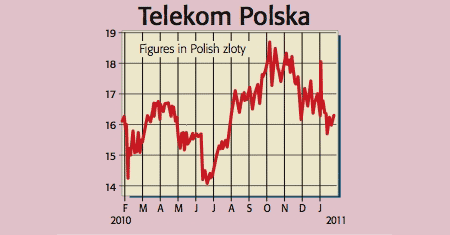
Poland is one of my favourite emerging markets. Asia, Russia and South America may get all the media coverage, but in terms of growth rates, fiscal parsimony and corporate governance, Poland offers an exciting mix.
Foreign investors can rely on Poland’s legal system, which is similar to Germany’s, and protects property ownership and promotes sound business ethics. With average salaries being 2.5 times lower than they are in Britain, Poland is also an attractive location for global manufacturing organisations.
Furthermore, its public-sector debt is an enviable 55% of GDP and is expected to remain broadly static. This is because the government was one of the first to implement a raft of austerity measures back in 2009. Sure, inflationary pressures are building, but an 11.7% unemployment rate should act as a natural brake on rising prices.
But Poland’s trump-card over the rest of Europe is that it still uses its own currency, the zloty (Zl). During the 2008/2009 credit crisis, its currency helped the nation avoid recession, thanks to a hefty devaluation that boosted exports. In fact, last year GDP grew 3.7% as the country made hay on the back of Germany’s (its biggest trading partner) meteoric revival. According to the World Bank, output is predicted to leap by 4.1% in 2011 and 4.5% in 2012.
Telekom Polska (PW: TPS or LSE: TPSD), rated a BUY by Nomura
So how do you cash in? I would buy a large-cap dividend-payer, such as Telekom Polska. The group is the largest telecom network in central Europe, with operations in fixed-line, broadband, mobile and satellite communications. It’s Poland’s equivalent of BT, but with a wireless unit thrown in. This former state monopoly was privatised in 1998, with France Telecom and the government now owning stakes of 49.8% and 4.2% respectively. Better still, unlike BT, Telekom Polska isn’t burdened by a gigantic pension deficit. It also offers a whopping 9% dividend yield.
In relation to the numbers, I’m forecasting 2010 turnover and underlying earnings before interest tax, depreciation and amortisation (EBITDA) of Zl 15.7bn and Zl 4.8bn. That puts the shares on an enterprise value (EV)/EBITDA multiple of only 5.7. What’s more, net debt should come in at December at about Zl 4.3bn.After adjusting for an old Zl 1.5bn bill with Danish group GN Store Nord, that gives a comfortable EBITDA ratio of 1.2, compared to BT’s 1.5. I’d value the firm on a through-cycle EBITDA multiple of seven, which generates an intrinsic worth of about Zl 20 per share.
Fine, but what are the possible pitfalls? Operating in any competitive and regulated industry presents its usual headaches. British investors also need to consider foreign-exchange fluctuations. Still, the group is based in a relatively stable emerging market and is well placed to benefit from Poland’s future prosperity.
Nomura has a target price of Zl 19.2 per share and preliminary results are due out on 23 February. The stock is traded in Warsaw and as a dollar denominated global depositary receipt in London ($:Zl = 2.9).
Recommendation: BUY at Zl 16.0 (market cap of Zl 21.4bn, equivalent to $7.4bn)
• Paul Hill also writes a weekly share-tipping newsletter, Precision Guided Investments